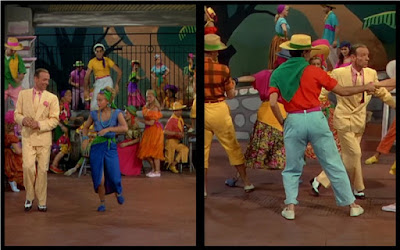Royal Wedding is a 1951 MGM musical comedy film starring Fred Astaire and Jane Powell, with music by Burton Lane and lyrics by Alan Ja...
Royal Wedding is a 1951 MGM musical comedy film starring Fred Astaire and Jane Powell, with music by Burton Lane and lyrics by Alan Jay Lerner. The film was directed by Stanley Donen; it was his second film and the first he directed on his own. It was released as Wedding Bells in the United Kingdom. The story is set in London in 1947 at the time of the wedding of Princess Elizabeth and Philip Mountbatten, Duke of Edinburgh. Astaire and Powell are siblings in a song and dance duo, echoing the real-life theatrical relationship of Fred and Adele Astaire. Royal Wedding is one of several MGM musicals that lapsed into public domain on their 29th anniversary due to failure to renew the copyright registration. {full_page}
Fred Astaire as Tom Bowen
Jane Powell as Ellen Bowen
Sarah Churchill as Anne Ashmond
Peter Lawford as Lord John Brindale
Keenan Wynn as Irving Klinger/Edgar Klinger
Albert Sharpe as James Ashmond
The story sees brother and sister Tom and Ellen Bowen as stars of a show Every Night at Seven, a Broadway success. They are persuaded to take the show to London, capitalizing on an imminent royal wedding.
On the ship, Ellen meets and quickly falls in love with the impoverished but well-connected Lord John Brindale. Whilst casting the show in London, Tom falls in love with a newly engaged dancer, Anne Ashmond. Tom assists Anne to reconcile her estranged parents and also asks his agent to locate Anne's supposed fiancé in Chicago – only to discover that he's married.
Carried away by the emotion of the wedding, the two couples decide that they will also be married that day.
- "Ev'ry Night At Seven": Astaire pretends to be a bored king alongside a lively Powell.Astaire in
- "Sunday Jumps""Sunday Jumps": Astaire credits the idea for this solo to his long-time choreographic collaborator Hermes Pan. In it, Astaire parodies himself by dancing with a hatstand and appears to parody his rival and friend Gene Kelly by inserting a mock bodybuilding episode during which he kicks aside some Indian clubs in a reference to Kelly's "Be A Clown" routine with The Nicholas Brothers in The Pirate. The fame of the dance rests on Astaire's ability to animate the inanimate. The solo takes place in a ship's gym, where Astaire is waiting to rehearse with his partner Powell, who doesn't turn up, echoing Adele Astaire's attitude toward her brother's obsessive rehearsal habits to which the lyrics (unused and unpublished) also made reference. In 1997, Astaire's widow Robyn authorized Dirt Devil to use a digitally altered version of the scene where Astaire dances with a hatstand in a commercial; Astaire's daughter Ava objected publicly to the commercial, implying they had "tarnish his image" and saying it was "the antithesis of everything my lovely, gentle father represented"
- "Open Your Eyes": This waltz is sung by Powell at the beginning of a romantic routine danced by Powell and Astaire in front of an audience in the ballroom of a transatlantic liner. Soon, a storm rocks the ship and the duet is transformed into a comic routine with the dancers sliding about to the ship's motions. This number is based on a real-life incident which happened to Fred and Adele Astaire as they traveled by ship to London in 1923.
- "The Happiest Days of My Life": Powell's character sings this ballad to Lawford's, with Astaire sitting at the piano.
- "How Could You Believe Me When I Said I Love You When You Know I've Been a Liar All My Life" has what is considered the longest title of any song in MGM musical history. For the first time in his career,[6] Astaire casts aside all pretension to elegance and indulges in a comic song and dance vaudeville-style with Powell. The routine recalls the "A Couple Of Swells" number with Judy Garland in Easter Parade.[citation needed] Here, for the second time in the film, he seems to parody Gene Kelly by wearing the latter's trademark straw boater and employing the stomps and splayed strides that originated with George M. Cohan and were much favored in Kelly's choreography.
- "Too Late Now": Powell sings her third ballad, this time an open declaration of love, to Lawford.
Stanley Donen and Jane Powell were not part of the film's original crew and cast; former dancer Charles Walters was the film's original director, with June Allyson as Astaire's co-star. Judy Garland was then signed as Ellen, over the objection of Walters who had spent a "year-and-a-half nurturing her through her previous film, Summer Stock"; instead of listening to Walters' objection, Arthur Freed brought in Donen as director; Garland, who during rehearsal worked only half-days, started calling in sick as principal photography was to begin. That prompted Freed to replace her, which in turn caused MGM to cancel her contract with the studio, one that had lasted 14 years.
![[headerImage]](https://blogger.googleusercontent.com/img/b/R29vZ2xl/AVvXsEgRuWu3A2HJQaY1te6vd8bmhXoLcwpPmuHFBbnGTVwY1Js4nmP0adB-epWofyF2HX8QO899_cJ9vtlQ6T1RiTnXmQ7qQPLmiuGwSEmXNFvESYgCBiyKushvj5hzA0mVXJ9y4w325bL1nqAP/s16000/Royal_Wedding.jpg)














